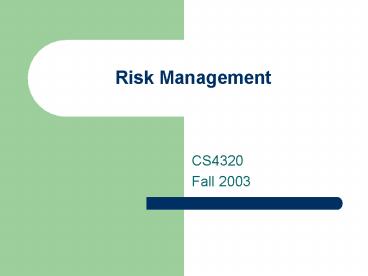Risk Management - PowerPoint PPT Presentation
1 / 20
Title:
Risk Management
Description:
PROBE Time and Size Worksheets Eric Tsai and Gavin Cramblett ... Estimate risk exposure (Quantitative) Evaluate risk against criteria (Severity, Time) ... – PowerPoint PPT presentation
Number of Views:15
Avg rating:3.0/5.0
Title: Risk Management
1
Risk Management
- CS4320
- Fall 2003
2
Use Cases
- Fill Out Time Log Dan Frazier
- Fill Out Defect Log Kristen Vadas
- Track Task EV Michael Caudle
- Fill Out Task and Schedule Form (Ind) Thomas
Case and Deepak Subramanian - PROBE Time and Size Worksheets Eric Tsai and
Gavin Cramblett - Fill Out Team Task and Schedule Form Robert
Gash and Spencer Huang
3
Use Cases
- Monitor/Assign Team Roles Jeremy Haile
- Generate/View Team Reports Brett Flurry and
Joshua Thames - Manage Projects Viona Tjong
- Manage Teams Bruce Ota
- Prepare Project Reports Charles Murff
- Unassigned ?? Michael Johnson, Chelsea Morrisey,
Nitika Raj - Risk Management Plan
- Configuration Management Plan
- Project and Measurement Plan
4
What is a risk and why do I care?
I am used to thinking 3 or 4 months in advance
about what I must do, and calculate on the worst.
If I take so many precautions it is because it
is my custom to leave nothing to chance. --
Napolean I 1808
- A potential problem
- Risk has 2 parts
- Probability (Likelihood)
- Consequence (Loss)
- Risk results in Exposure Frequently referred to
as L2
5
Risk Management
- Assessment
- Identification
- Analysis
- Prioritization
- Control
- Planning
- Resolution
- Monitoring
6
Types of Risk
- Project
- Operational
- Organizational
- Contractual
- Process
- Management
- Technical
- Product
http//www.cc.gatech.edu/classes/AY2003/cs3911_sum
mer/risks.pdf
7
We cant do everything
Sometimes we need to do ROI or CBA to determine
whether risk measures are cost-effective
Cost
Risk Exposure
Cost of resolution
Risk
8
Characteristics of Good Risk Mgt
- Proactive
- Integrated
- Systematic (20/80 rule IDControl)
- Disciplined (P2I2)
- People
- Process
- Infrastructure
- Implementation
9
Levels of Risk Management
- Crisis Management (Fire Fighting)
- Fix on Failure
- Risk Mitigation
- Risk Prevention
- Elimination of root causes
10
Risk Identification
- Conduct a risk assessment. (Formal, interviews,
facilitated meetings) - Identify risk systematically. (Checklists)
- Define risk attributes (L2) (Qualitative).
- Document identified risk.
- Communicate identified risk.
11
Risk Analysis
- Group similar and related risks
- Determine risk drivers
- Determine source of risk (root cause)
- Use risk analysis techniques and tools
- Estimate risk exposure (Quantitative)
- Evaluate risk against criteria (Severity, Time)
- Rank risks relative to other risks (Top-n)
12
Risk Analysis Techniques
- Causal Analysis (Cause-Effect)
- Decision Analysis
- Decision Tree
- Influence Diagram
- Gap Analysis
- Magnitude (i.e. importance performance)
- Radar Charts
- Pareto Analysis
- Sensitivity Analysis
- Technical Models, Prototypes
- COCOMO II http//sunset.usc.edu/research/COCOMOII/
index.html
13
Top-n List Format
14
Risk Planning
- Develop scenarios for high-severity risks
- Develop resolution alternatives
- Select resolution approach
- Develop risk action plan
- Establish thresholds for early warning
- When should I start getting worried?
15
Risk Scenario
- Think about risk as if it has occurred
- State the sequence of events
- List the events and conditions that would precede
risk occurrence.
16
Risk Resolution Alternatives
- Acceptance
- Avoidance (Eliminate)
- Protection (Redundancy)
- Reduction (Mitigation, Prevention, Anticipation)
- Research (Need more info)
- Reserves (Slush fund, bank, pad)
- Transfer (shift to someone else)
Do Risk resolution for home PC against lightning.
17
Selection Criteria
- Picking a cost effective strategy
- Risk Leverage (cost-benefit)
- RE(before) RE(after) / Resolution Cost
- ROI SSavings/Cost
- Diversification
- Dont put all the eggs in one basket.
18
Risk Tracking
- Monitor risk scenarios
- Compare thresholds to status
- Provide notification for triggers
- Report risk measures and metrics
19
Risk Resolution
- Respond to notification of triggering event
- Execute risk action plan
- Report progress against plan
- Correct for deviations from plan
20
Risk is Risky Business
Risk is inherent in the development of any large
software system. A common approach to risk is to
simply ignore it.
Those who choose to minimize or avoid risk, as
opposed to manage it, are setting a course for
obsolescence.
If you dont actively attack risks, they will
actively attack you.
Whatever can go wrong will go wrong, and at the
worst possible time.
If you have brainstormed 4 ways that your project
can fail, a new 5th way will present itself.































